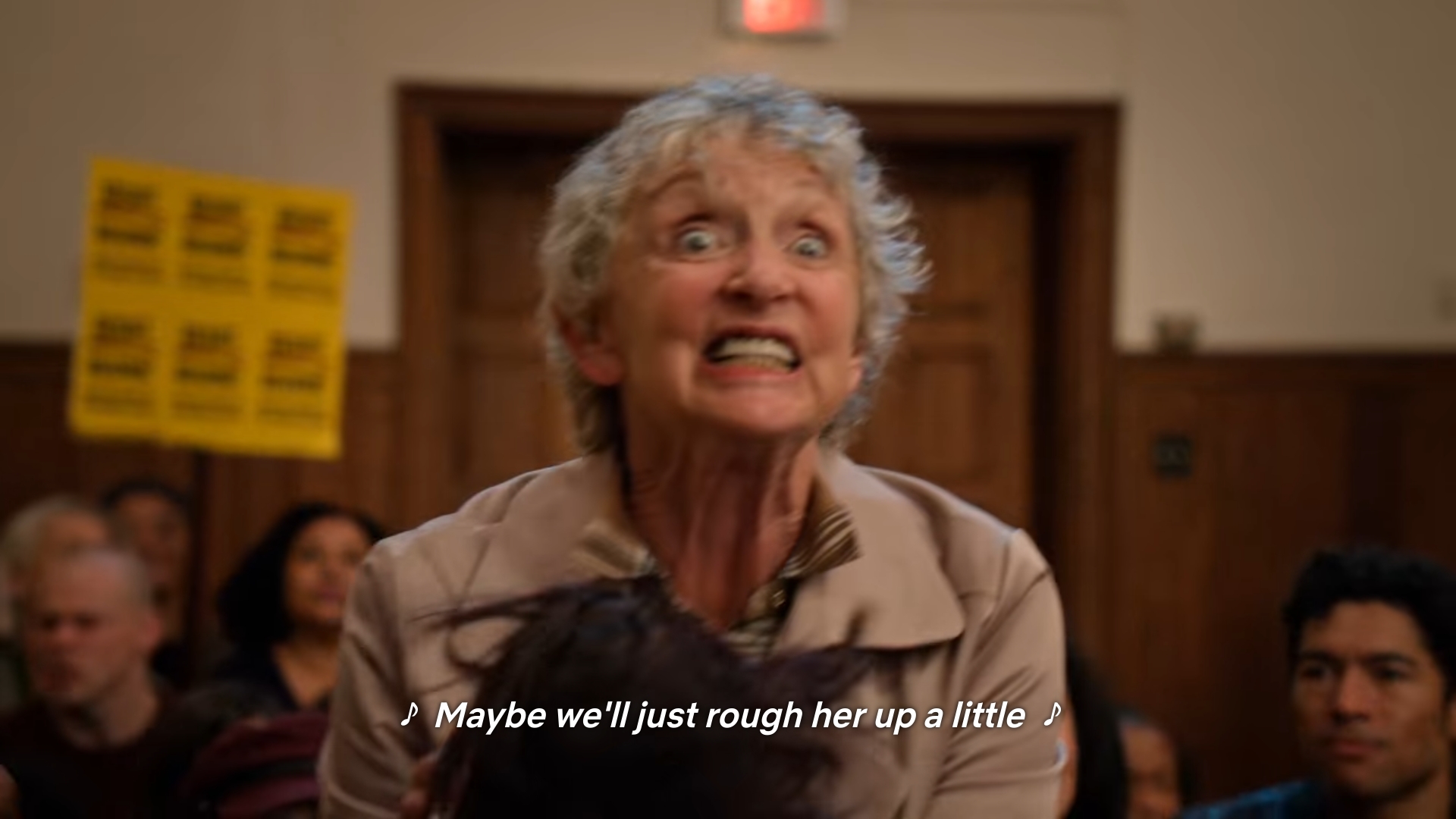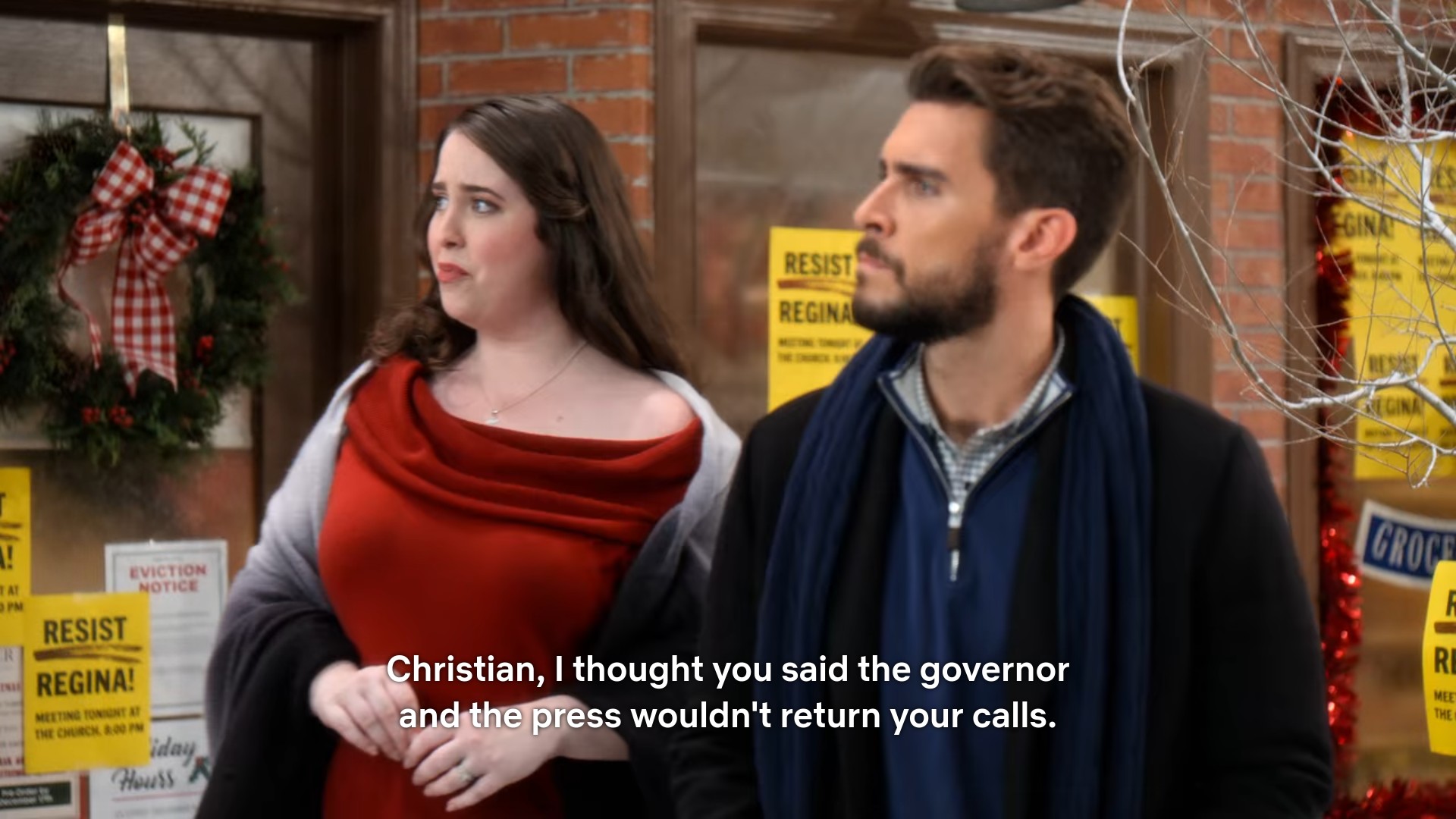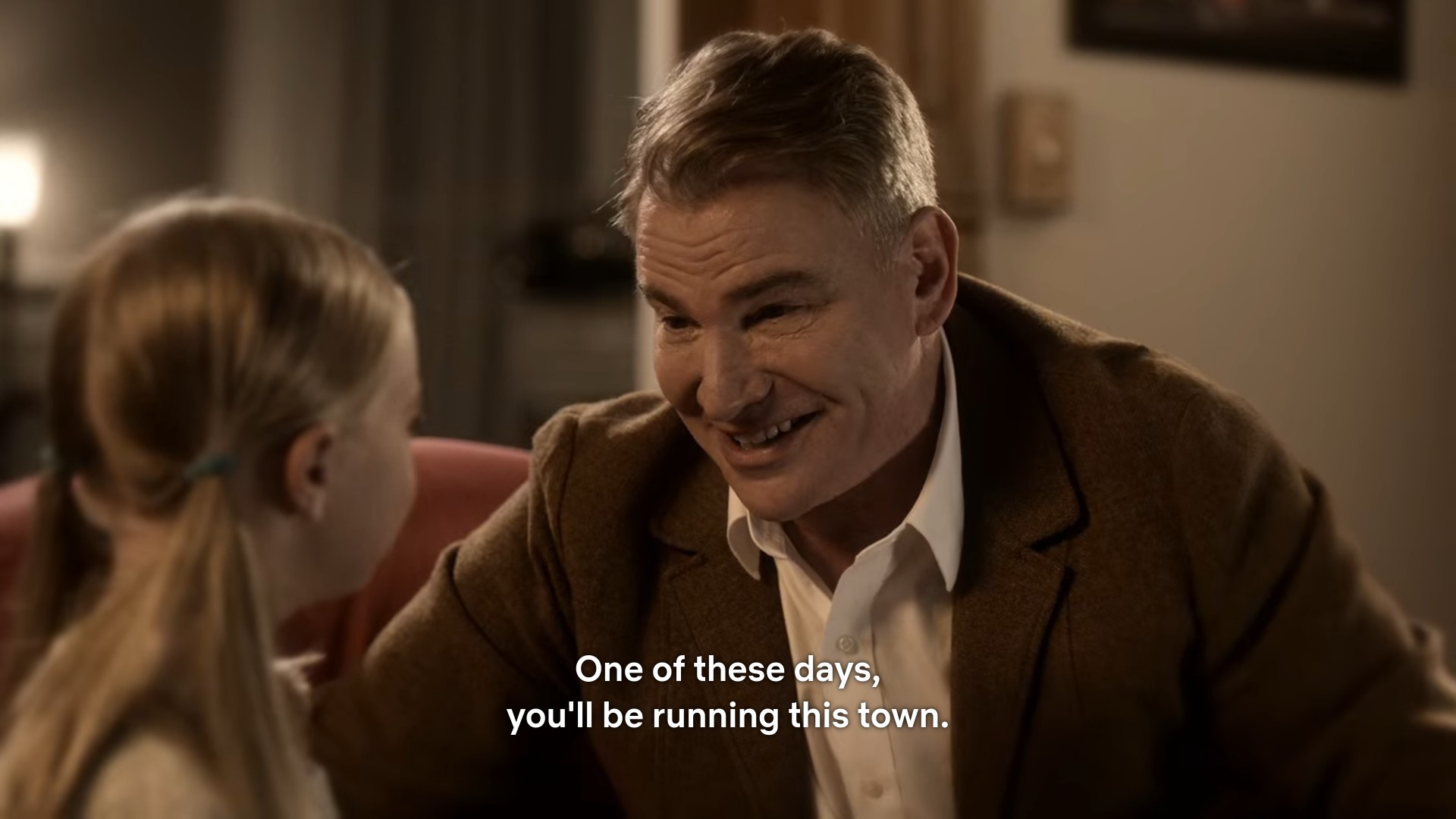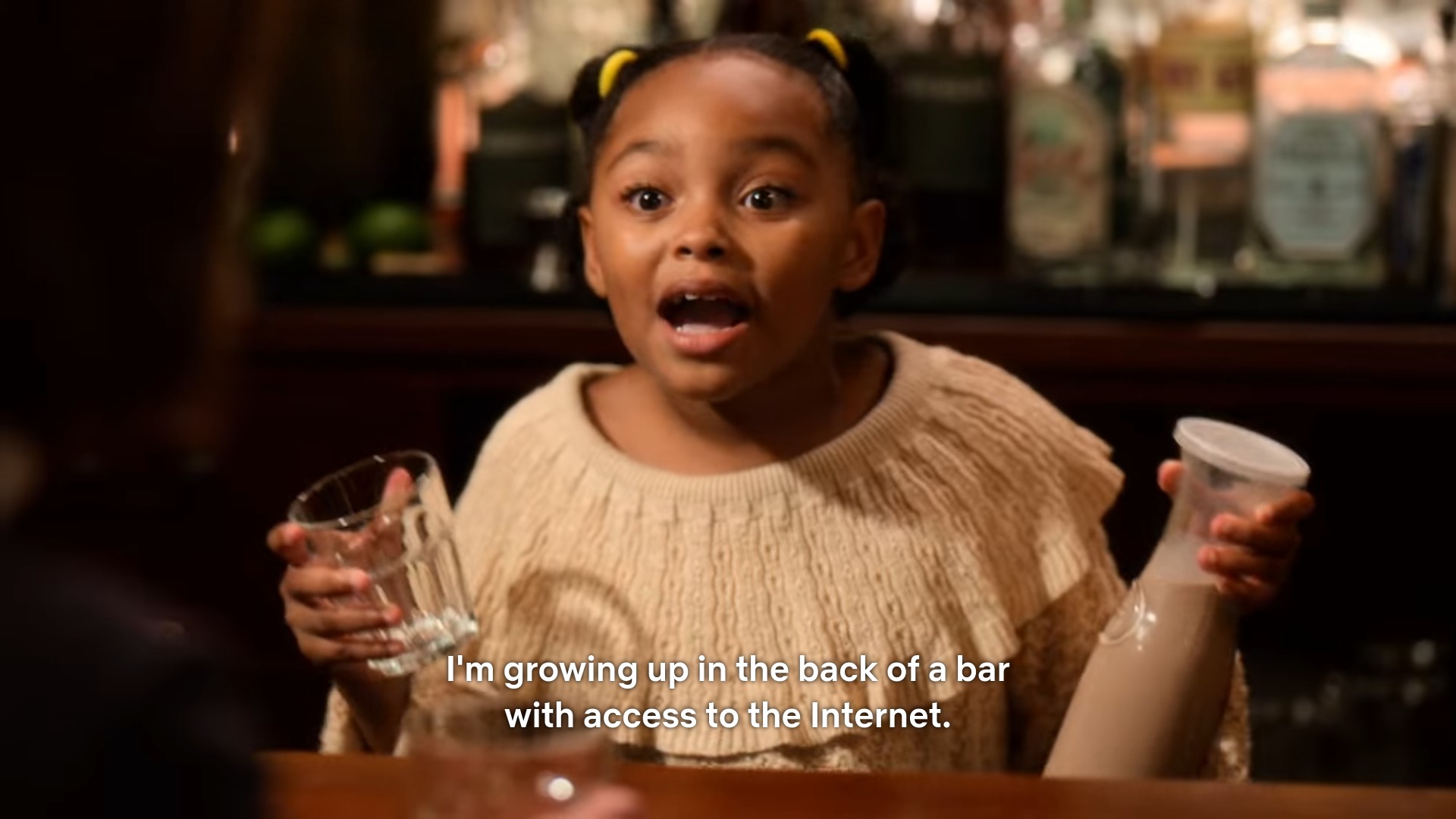Let me get one thing out of the way: absolutely no one was tuning in to Dolly Parton’s 2020 movie-musical Christmas on the Square expecting thought provoking socio-economic commentary. You watch this movie for the over-the-top musical numbers and the child-bartender and Dolly Parton wearing an increasing amount of rhinestones in each scene. And boy does it deliver on those fronts. That being said, I think the way this movie adapts the classic “A Christmas Carol” story is a bit… odd. If you haven’t seen this movie yet, which I definitely recommend you do because it is insane. It features Christine Baranski as Scrooge Regina Fuller, a cold-hearted banker midwestern landowner who is visited on Christmas Eve by Christmas Ghosts an angel, played by Dolly Parton, who helps her see the error of her selfish ways and go to his nephew’s Christmas party reconnect with her community. There are a lot of parallels to A Christmas Carol, is what I’m getting at. As with everything in this movie, the Christmas Carol plot beats are cranked up to 11, and this includes the cruelty of the villain-protagonist and the righteous fervor of the commoners. In this one area, I think, the cranking up of things acted to the detriment of its plot, in a way that I’ll explain… now.
(I’m going to spoil everything so, don’t read this post if you care.)
Christmas on the Square as pro-feudalism propaganda
The central conflict of this movie is as follows: Regina Fuller’s father, who founded and owned the entirety of the town of Fullerville, has recently died, and she has inherited the property. Regina, who fled town in her youth due to the shame of a teen pregnancy, has bad memories of Fullerville and doesn’t want to be responsible for owning it, and so sells the entire town to a development company that plans to build a mall (“Cheetah Mall”, lmao) in it’s place. To this end, the film opens with Regina handing out eviction notices to literally everyone in town, including some dogs. Everyone has to move by the end of the month. This is later upgraded to “by Christmas Eve” in retaliation after the townsfolk complain.

This is the first place I think the movie goes a bit too far. If you look at the character of Scrooge, who Regina is modeled after, his crimes as portrayed in A Christmas Carol lack the same immediate cruelty. In the opening bit of A Christmas Carol, Scrooge is portrayed as a person of extreme greed and indifference, a Malthusian who would rather fund prisons and workhouses than donate to the poor, just because it is cheaper for him. Would Scrooge do what Regina does if put in the same position? Absolutely. But we don’t actually see him do this in the story, in the story he’s just a giant stick in the mud who refuses to celebrate Christmas with his own family and who doesn’t want to donate money to help the poor or to give his employees holiday PTO (a thing he does do). He’s a horrible person, but doesn’t evict his entire hometown on a whim. You could probably argue that with Scrooge’s political donations he’s made society as a whole worse than Regina has, but that requires you to think about it. There’s something immediately horrifying about the flippant way Regina delivers eviction notices to her childhood friends, as if the compensation they are receiving makes it ok.
The townsfolk of Fullerville are very pissed about the evictions. Organized by the local pastor (whose name is Christian, lmao), they stage a “resistance” (can’t say “protest” or “renters strike”, that’s too political for this movie about a mass-eviction). At their meeting there’s an entire musical number about how much they hate Regina’s guts and want to literally beat her ass.

Pastor Christian appeals to their better nature and calms them down, but I was kind of sitting their like… but you could beat her up though? Like, literally beating her up maybe isn’t necessary, but you could all go to her house and detain her so she can’t sign the legal papers to sell your town and force you all to move. There’s literally only her and her assistant in the palatial manor she lives in. What’s she gonna do, call the cops, who she’s also evicting? In the first five minutes of the film, Regina says, to Pastor Christian, that she “just need[s] to close this deal by the end of the year”, so it seems like it would also be pretty straigtforward for someone to just sneak into her house and steal the comically gigantic contract so that she can’t. In the past two years, there have been many instances of protestors blocking courthouse doors to prevent eviction hearings from taking place, or physically stopping sheriffs from evicting tenants who cannot pay rent due to COVID-related job loss. The situation portrayed in the movie isn’t dissimilar and those tactics would have worked.
Even short of all that, I’m pretty sure landlords can’t just cancel your lease agreement midway through, they also signed a contract and tenants have rights. According to my googling, in the state of Kansas, where Christmas on the Square takes place, how much notice your landlord gives you before deciding not to renew your lease seems to be specific to the terms of a given lease, but even then that wouldn’t be an eviction. The only way Regina could legally evict the town in the middle of their leases is if she claimed they were violating some term of the lease agreement (which she does not claim). Then she would have to provide two weeks notice for them to remedy the situation, and then they would have thirty days after that to vacate. Then, Regina could start legal action, during which the townsfolk would still be physically in their homes and businesses vibing and keeping it tight. So this town could probably just collectively refuse to leave and take Regina to court and win. It’s interesting that Pastor Christian claims that they’re using “the Governor, the press, any possible means to stop [Regina]” but not a lawyer.

But, the townsfolk don’t do any of the above stuff, and in fact do absolutely nothing, except… I guess, pray about it, offscreen? Luckily for them, that works, and God does send an angel to change Regina’s mind. But what kind of message does that send? Oh, you’re getting unjustly evicted, just hope you can appeal to your landlord’s better nature so they won’t evict you? Honestly, that’s kind of an awful message to send in 2020 especially, in light of the, you know, still-ongoing COVID-19-related eviction crisis.
This reaction from the townsfolk is where the plot of this movie really loses me. I think they should have gone campier and played up the cartoonish harshness of Regina’s behavior. By focussing on the townsfolk “resisting” at all, it forces the movie to take a stance on dealing with bad landlords that it isn’t prepared to commit to. Real resistance was probably also a lot more anti-capitalist than Dolly Parton was willing to be. That said, in my opinion, if she did follow through and make the townsfolk actually resist in any meaningful way, it would have detracted from the main thrust of the movie, which is the redemption of Regina’s soul through Jesus or whatever. But even without that this B-plot wastes a lot of time as it is, because the resistance movement goes nowhere and nothing comes of it at all. Regina has her change of heart because of visions of the past given to her by an angel, not anything the townsfolk are shown doing. In the end, the whole “resistance” thing turns into this weird neoliberal idea of what a “good protest movement” looks like, which I guess is putting up signs and marching around and bothering no one and then just moving to a new town because you did get evicted.
Now for some uninformed Dolly Parton psychoanalysis: when do you think was the last time Dolly Parton had to rent anything? The intended audience of this story just isn’t tenants. No, the moral of this story is directed towards the sorts of town-owningly-rich people that Dolly Parton probably knows and interacts with regularly. It’s not a fable about how to deal with your landlord, whether that be through God or however else, it’s a fable encouraging the owning class to consider the wellbeing of the people they have power over. At the end of the movie, Regina has a change of heart which leads her to reverse her decision to sell the town. That is the extent of her generosity, the status-quo is not challenged in any way, and she does nothing altruistic, she just stops doing the awful thing she was about to do. So it’s a reassurance to the Johnny Roses of the world that there’s nothing wrong with the amount of power they have over others, they just have to be nice to the people they control on an individual, interpersonal level, and then society will prosper.
This movie goes really hard on the whole “the solution to a bad landlord is a good landlord!” angle, and really I didn’t expect anything else from Netflix and Dolly Parton, but it’s sort of wild how the movie expects you to see Regina’s position (separate from her behavior) as a good and normal thing. She’s brought back to the light side by memories of her dad, the Good Landlord™ who “kept rents low and spirits high!” and was beloved by the townsfolk for his good… property management skills? His “governance” seemed to be largely in the form of funding new construction and selecting “good” businesses for the town, which means, what? Refusing to rent to people who aren’t up to the town’s standard? Whatever that is? We see, in a flashback, Regina’s dad telling her that someday she’ll be in charge and must lead the town with a compassionate hand, and it’s like, wait what? What is this feudal bullshit?

Regina’s best friend from childhood repeatedly references being the town’s first female mayor (this movie is very woke there was a woman in government you see!) and my reaction is, you guys have a mayor? What for, it looks like you already have a literal baroness! Regina’s name is literally latin for Queen! What’s the point of having an elected leader when there’s a single unelected individual who can just make your entire town disappear because they feel like it with zero oversight? And where is the current mayor? Are they helping? It seems like the closest thing Fullerville has to leadership currently is the pastor of the single church that literally everyone attends. That said, what could a mayor or a pastor alone possibly do to prevent Regina from kicking everyone out, if they’re also tenants? It’s an insane status-quo and no one in town should be ok with it, regardless of how nice Regina or her father are.
In conclusion, I have one simple change that I think would have fixed Christmas on the Square for me: at the end, when Regina decides not to evict everyone, have her give them ownership of their homes and businesses instead. I can’t believe, that after this whole movie, the big joyous change of heart is just Regina deciding not to do the shitty thing she was about to do. Again, she doesn’t do a positive thing, she is just convinced not to do a negative thing. She decides to continue being the town’s literal baroness but now she promises to become a true member of the community, and everyone’s ecstatic about it. But what better way to apologise for the stress she caused than to remove the possibility of anyone ever pulling such a stunt again? And what better way to become a community member than to remove the power imbalance that separates her from the rest of the town? And what could be Christmassier than giving everyone a gift, for Christmas. The movie’s opening number states that “Christmas is a time for givin’” - I think this movie would have worked a lot better if that idea was actually expressed at all by the plot.
